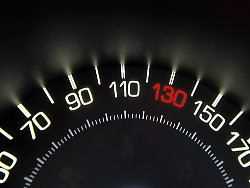Friday 29 October 2021
Transport under CO2 pressure
Umweltthilfe suggests a temporary speed limit
So far, the FPD in particular has been fighting against climate-related hardship for drivers in the traffic light talks. When it comes to the speed limit, environmental aid is now increasing the pressure: The instrument could be limited in time and would immediately bring CO2 savings to the transport sector.
In view of the rejection of a general speed limit by the parties to a possible traffic light coalition, Deutsche Umwelthilfe (DUH) has called for a temporary speed limit. “In 2021, the transport sector will tear itself down from the weak savings targets of the previous climate protection law,” said DUH Federal Managing Director Jürgen Resch. The federal government is therefore obliged to take immediate measures. The only effective instrument is a speed limit. This must therefore apply from January at least for the years 2022 to 2024.
“Temporary speed limits, for example due to frost damage, are common practice,” emphasized Resch. “Now we need a speed limit because of climate damage.” A temporary speed limit is also “not in contradiction to the exploratory paper” of the SPD, Greens and FDP. The position paper for the coalition negotiations states: “There will be no general speed limit.”
DUH wants to sue if necessary
With a speed limit for motorways and the reduction of the maximum speed outside urban areas to 80 and in urban areas to 30 kilometers per hour, up to eight million tons of CO2 per year could be saved, explained the environmental aid. She also wants to pursue her plan to enforce a speed limit in court if necessary. A corresponding lawsuit to force the federal government to comply with its climate obligations in the transport sector had already been filed with the Berlin-Brandenburg Higher Administrative Court in autumn 2020.
The Federal Environment Agency had also previously increased the pressure to reform the transport sector. On Thursday, the authority calculated that the abolition of environmentally harmful subsidies in Germany could open up billions in financial leeway for more climate protection and social justice.
According to a UBA study, there were environmentally harmful subsidies totaling at least 65.4 billion euros in Germany in 2018. Of this, 47 percent was attributable to the transport sector alone. The UBA then recommended the abolition of the ecologically questionable commuter allowance. In the coalition negotiations, the FDP in particular is resisting a change in the status quo with regard to both the speed limit and the commuter allowance.
